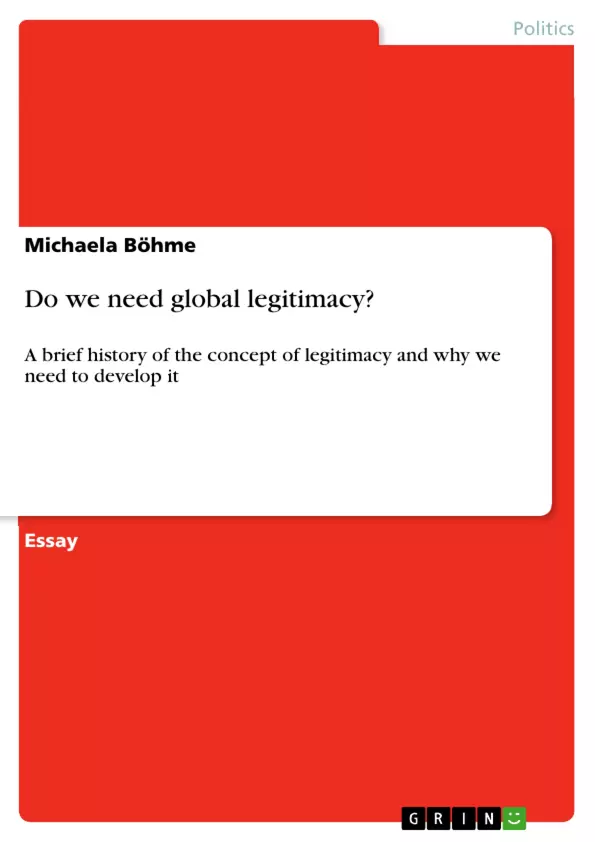Legitimacy theory has developed from a western human centric point of view. The initial question was how to control human beings. In answer to this question, the nation state – a hierarchical ordered construct – was invented. The concept of legitimacy refers to the people’s acceptance of this political entity. Thus, the concept of political legitimacy is historically bound to the nation state and its political system. Recent developments attempt to question this. This becomes most obvious when it comes to the global problems we are facing. We live in a complex global governance system and affecting decisions are made by global organizations beyond the nation state. Just as the state is no longer capable of controlling and managing society anymore I argue that the society is no longer capable of controlling the decisions made within – or beyond – a nation state. Neither our traditional tools of domestic democracy, nor such instruments as state consent on a global level are longer sufficient.
Inhaltsverzeichnis (Table of Contents)
- Introduction
- Theoretical background
- The concept of legitimacy
- Realization of legitimacy
- The state in the 21st century
- Global Legitimacy
- Why we need it
- How we achieve it
- Political legitimacy and the WTO
- World Trade Organization
- The legitimacy of the WTO
- How to solve the problem?
- Conclusion
Zielsetzung und Themenschwerpunkte (Objectives and Key Themes)
This paper aims to analyze the historical evolution of the concept of political legitimacy and argue for its relevance in a global context, particularly in light of the challenges posed by global organizations such as the WTO. It seeks to demonstrate that traditional models of legitimacy, rooted in the nation state, are insufficient to address the complexities of global governance.
- The historical development of the concept of political legitimacy
- The role of the nation-state in establishing and maintaining legitimacy
- The challenges of legitimizing global organizations
- The need for a renewed understanding of legitimacy in a globalized world
- The role of state consent and developing countries in global governance
Zusammenfassung der Kapitel (Chapter Summaries)
- Introduction: This section introduces the topic of legitimacy, emphasizing its broader significance compared to democracy. It highlights the need to reconsider legitimacy in a global context, linking the present work to a previous paper on democratic renewal in Europe.
- Theoretical background: This section delves into the history of legitimacy theory, starting with Thomas Hobbes and his emphasis on the barbaric nature of humans. It explores the role of the sovereign in providing order and control, and contrasts this with John Locke's belief in a natural state of equal rights. The section concludes with Jean-Jacques Rousseau's concept of the Volonté Générale, emphasizing the importance of free will and the rule of law for achieving legitimacy.
- Global Legitimacy: This chapter discusses the reasons why we need global legitimacy and the challenges of achieving it. It explores the limitations of traditional models of legitimacy and argues for the need for a new understanding of legitimacy in a globalized world.
- Political legitimacy and the WTO: This chapter focuses on the World Trade Organization (WTO) as an example of a global organization struggling with legitimacy. It examines the difficulties of legitimizing such organizations in a globalized world, particularly with regard to state consent and the concerns of developing countries.
- How to solve the problem?: This chapter explores potential solutions to the problem of legitimizing global organizations. It draws connections to the historical development of legitimacy theory and suggests possible ways forward.
Schlüsselwörter (Keywords)
Key terms and concepts explored in this paper include political legitimacy, global legitimacy, nation-state, global governance, World Trade Organization (WTO), state consent, developing countries, and the Volonté Générale. The paper examines the historical development of legitimacy theory and explores its implications for a contemporary globalized world.
Frequently Asked Questions
What is the concept of political legitimacy?
Political legitimacy refers to the people's acceptance of a political entity or system. Historically, it is closely tied to the development of the nation-state.
Why is traditional legitimacy insufficient today?
Traditional models are rooted in the nation-state. However, in a globalized world, many decisions are made by organizations beyond the state, which traditional domestic democracy cannot control.
What role does the WTO play in the legitimacy debate?
The World Trade Organization (WTO) serves as an example of a global organization that struggles with legitimacy, particularly regarding state consent and the interests of developing countries.
What is the "Volonté Générale" in this context?
Based on Rousseau's theory, the "Volonté Générale" (General Will) emphasizes the importance of free will and the rule of law as foundations for achieving political legitimacy.
How can global legitimacy be achieved?
The paper suggests that new instruments beyond state consent are needed to legitimize global governance and ensure that global decisions reflect the will of society.
- Arbeit zitieren
- Michaela Böhme (Autor:in), 2011, Do we need global legitimacy?, München, GRIN Verlag, https://www.grin.com/document/210361



